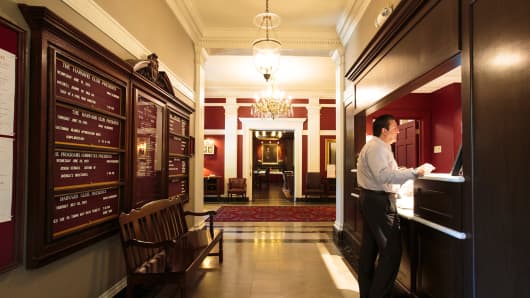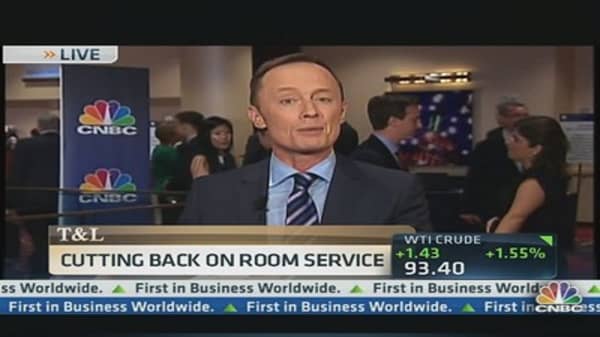But the overnight lodgings typically "don't offer all the facilities and amenities that contemporary first-class hotels do," said John W. O'Neill, director of the School of Hospitality Management at Pennsylvania State University. Rooms and bathrooms built in another era may be quite small, and work spaces often need updating for the tech-equipped traveler. Club hotels are also slower to install upgrades like wall-mounted televisions.
In the end, Mr. O'Neill said, these factors translate to lower overnight room rates, which also do not fluctuate as much as they do at regular hotels and do not increase when conventions or other events are in the city.
Club hotels offer intangible benefits as well. All visitors typically check in with a front desk attendant whether they are coming in for dinner, a workout or overnight stay, so security is tighter than in the public lobby spaces of hotel chains. At the Union League Club of Chicago, the doors are locked at midnight for extra security, and guests arriving after that time must be buzzed in.
The opportunity for networking is also better, according to Suzanne Garber, who has used a wide range of lodgings in her travels as a speaker on corporate risk management and travel security.
"The people you meet at these clubs have been vetted, if you will, by the club for inclusion in their membership," she said. "They must meet academic, financial or other professional criteria, so you are ensconced with high-level people."
The criteria on who can join vary. At the Cornell Club, alumni, family of alumni and staff from Cornell or affiliated schools including Brown, Duke, Georgetown and Stanford can join. At the Yale Club, memberships are available to Dartmouth and University of Virginia graduates.
And they vary in size. The Harvard Club in Boston has 42 guest rooms while the Yale Club has 138 rooms, including seven suites that accommodate up to six people.
Although the university and private clubs are generally not part of a national or global hotel chain, as Dr. Krameisen found they do offer reciprocal benefits with other clubs across the country and internationally. The Harvard Club, for example, has 130 reciprocal clubs, and San Francisco's University Club has agreements with 240 other clubs around the world.
For some potential guests, the rules at a club hotel can be a drawback. While a T-shirt, shorts and running shoes would not seem out of place in most hotel lobbies, dress restrictions may apply at the university and private clubs. At the Union League Club of Chicago, guests must abide by a dress code that requires business casual attire on weekdays and forbids athletic apparel in the public spaces.
Club hotels may also limit the use of electronics in public spaces, giving them a far different atmosphere than chain hotel lobbies, which can become hubs of informal business meetings held over laptops.
At the Yale Club, for example, guests are asked to turn off cellphone ringers and speak on their phones only in specified places. The Princeton Club has similar cellphone restrictions with defined areas where they can be used. Personal computers and devices with earbuds are not permitted in the Yale Club lobby, and cameras are prohibited. And the Union Club in New York takes the electronics ban a step further, prohibiting text messaging in public areas.
While frequent business travelers may prefer their favorite hotel chains for their loyalty program points or a preferred type of pillow, others take a different view.
J. D. Delafield grew up in New York and now lives with his family in Seattle. On business trips to New York City, he stays at the Union Club, where he has been a member for almost 20 years. "The books in the library, the art on the walls — it's a beautiful place to soak up history," he said, "and it's always easy to get a cab."




